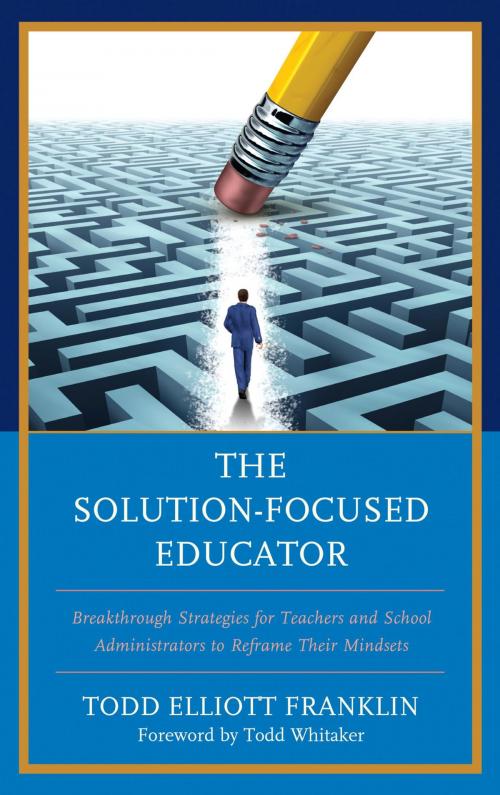The Solution-Focused Educator
Breakthrough Strategies for Teachers and School Administrators to Reframe Their Mindsets
Nonfiction, Reference & Language, Education & Teaching, Educational Theory, Leadership, Administration| Author: | Todd Elliott Franklin | ISBN: | 9781475837810 |
| Publisher: | Rowman & Littlefield Publishers | Publication: | March 1, 2018 |
| Imprint: | Rowman & Littlefield Publishers | Language: | English |
| Author: | Todd Elliott Franklin |
| ISBN: | 9781475837810 |
| Publisher: | Rowman & Littlefield Publishers |
| Publication: | March 1, 2018 |
| Imprint: | Rowman & Littlefield Publishers |
| Language: | English |
The Solution Focused Educator is intended for classroom teachers and school based administrators at all levels. The content serves as a roadmap for how educators can reframe their mindset to tackle the current challenges in schools. Examples are given throughout the book to demonstrate how you can reduce stress by learning new mental strategies that shift problem solving away from needing others to change.
The goal is for teachers and school leaders to better understand how to reshape their preconditioned responses to challenges by closing the gap that exists between the experiences they have on the job and their reactive nature to them. The book captures a unique twist under the topic of motivation and how to reframe one’s attitude towards the typical discomforts faced by today’s educator. The writing aims to establish a deeper understanding about the intimate relationship between problem identification and the anxiety that ensues within this psychological dyad. Utilizing the shape of a triangle, the author consistently makes the mindset concepts easy to understand. He utilizes this shape as a strong representational pattern that clearly illustrates how educators can, mentally, diagram problematic issues, outline their emotional reactions to them, and create a new attitude of solvability.
The Solution Focused Educator is intended for classroom teachers and school based administrators at all levels. The content serves as a roadmap for how educators can reframe their mindset to tackle the current challenges in schools. Examples are given throughout the book to demonstrate how you can reduce stress by learning new mental strategies that shift problem solving away from needing others to change.
The goal is for teachers and school leaders to better understand how to reshape their preconditioned responses to challenges by closing the gap that exists between the experiences they have on the job and their reactive nature to them. The book captures a unique twist under the topic of motivation and how to reframe one’s attitude towards the typical discomforts faced by today’s educator. The writing aims to establish a deeper understanding about the intimate relationship between problem identification and the anxiety that ensues within this psychological dyad. Utilizing the shape of a triangle, the author consistently makes the mindset concepts easy to understand. He utilizes this shape as a strong representational pattern that clearly illustrates how educators can, mentally, diagram problematic issues, outline their emotional reactions to them, and create a new attitude of solvability.















